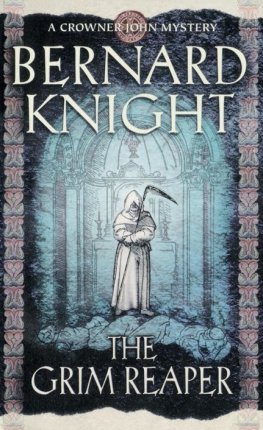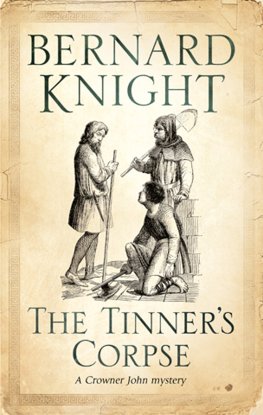Bernard Knight - The Manor of Death
Here you can read online Bernard Knight - The Manor of Death full text of the book (entire story) in english for free. Download pdf and epub, get meaning, cover and reviews about this ebook. year: 2008, publisher: Simon & Schuster UK, genre: Detective and thriller. Description of the work, (preface) as well as reviews are available. Best literature library LitArk.com created for fans of good reading and offers a wide selection of genres:
Romance novel
Science fiction
Adventure
Detective
Science
History
Home and family
Prose
Art
Politics
Computer
Non-fiction
Religion
Business
Children
Humor
Choose a favorite category and find really read worthwhile books. Enjoy immersion in the world of imagination, feel the emotions of the characters or learn something new for yourself, make an fascinating discovery.
- Book:The Manor of Death
- Author:
- Publisher:Simon & Schuster UK
- Genre:
- Year:2008
- ISBN:9781416525943
- Rating:4 / 5
- Favourites:Add to favourites
- Your mark:
- 80
- 1
- 2
- 3
- 4
- 5
The Manor of Death: summary, description and annotation
We offer to read an annotation, description, summary or preface (depends on what the author of the book "The Manor of Death" wrote himself). If you haven't found the necessary information about the book — write in the comments, we will try to find it.
The Manor of Death — read online for free the complete book (whole text) full work
Below is the text of the book, divided by pages. System saving the place of the last page read, allows you to conveniently read the book "The Manor of Death" online for free, without having to search again every time where you left off. Put a bookmark, and you can go to the page where you finished reading at any time.
Font size:
Interval:
Bookmark:
Bernard Knight
The Manor of Death
PROLOGUE
April 1196
A brisk south-westerly wind sent the two ships scudding up the Channel, almost midway between the Cotentin peninsula in Normandy and the coast of Devon. Both landfalls were far out of sight, which was just as well, given the bloody acts that were soon to take place.
The smaller vessel was faster than the heavy-laden cog, which was hauling a cargo from Barfleur up towards King Richard's new harbour at Portsmouth. The shipmaster was desperately trying to coax every knot from his ungainly craft, and the single sail bellied out so tightly that he feared that some of the stitched repairs in the fabric would tear apart. Every few moments he would look fearfully over his shoulder as he leant on the single long oar pivoted over the steerboard quarter. His heart chilled as with every glance he saw the lighter craft remorselessly overhauling the Blackbird. The other cog, though almost as squat and cumbersome, had a larger sail and a slightly less bulbous hull.
His four crewmen, powerless to do anything further to speed their ship, stared helplessly astern at what they feared would be their nemesis, for the men they could see on the deck were more than twice their number. As they came nearer, the desperate men on the Blackbird saw that two of the pursuing crew had crossbows ready strung, and the others brandished long knives, maces or short spears. The only one unarmed was a youth, who watched with horror as they drew alongside and, with ferocious yells, all except the steersman leapt across the bulwarks and lashed the two vessels together with ropes.
Within a couple of minutes all the Blackbird's crew were either lying dead on the deck in pools of their own blood or had been thrown overboard to drown in the choppy waters. The steersman of the pirate vessel abandoned his oar to rush across to join his shipmates on the way, he gave the youth a buffet across the head and yelled at him as he passed.
'Come on, you yellow-livered pansy, there's cargo to be shifted! Haven't you seen corpses before?'
Reluctantly, the lad followed him, but as soon as he had clambered over on to the other boat, he retched at the sight of two men lying with their throats cut and then vomited his breakfast on to the pitching deck. Another man grabbed him and threw him towards the single hatch, where the pirates were ripping off the loose planks that covered the hold. Gagging and keeping his eyes off the dead men nearby, he scrabbled at the boards and then toiled with the others in transferring the kegs of wine and dried fruit and the bales of Flemish cloth across to their own ship. As soon as everything had been pillaged, he heard the sound of axes smashing through the hull down below, and soon they all hurried back across the bulwarks to cast off the ropes before the doomed vessel could drag their own ship down with her.
Within a few moments the Blackbird rolled over and sank, taking the remaining corpses with her. Crossing himself, the young man sobbed out some prayers to himself and stayed hunched miserably in a corner against the forecastle, as the marauding cog turned north and clawed her way across the wind towards the distant shores of England.
CHAPTER ONE
Spring was in the air, but Sir John de Wolfe was oblivious to the primroses along the verges and the singing of little birds in the bushes. He had a boil coming on his backside, and riding a horse was the last thing he needed today.
'You need to see an apothecary, master,' chided Thomas de Peyne, his diminutive clerk. 'A good clay poultice would draw out the poison.'
'Or I could lance it with the point of my dagger!' offered Gwyn, his unsympathetic henchman, who rode on his other side as the three trotted along the road eastwards from Exeter.
The gaunt coroner scowled at his two assistants, not deigning to answer their helpful advice. He was too concerned about taking the weight off his bottom by pressing his feet down into the stirrups hardly the best way to cover the twenty miles to Axmouth. Before they had left soon after dawn, his housekeeper Mary had given him a folded pad of soft wool to slip inside his breeches, which helped a little. But now, as they entered the hamlet of Sidford some two hours later, he felt the need for a rest and some refreshment.
Gwyn of Polruan, a giant with unruly ginger hair and a drooping moustache of the same hue, had an insatiable appetite for food and drink, which led him unerringly towards one of the thatched cottages that clustered around the packhorse bridge that spanned the little River Sid. A bedraggled bush hanging over the low doorway indicated it was an alehouse, and soon a snivelling youth had led their horses around the back to be fed and watered, while the coroner's trio went inside to seek some victuals.
The building was old and decrepit, patches of the lime-and-horsehair plaster crumbling from the panels of hazel withies that filled the spaces between the timber frames of the single room. The floor was of beaten earth with a sparse covering of mouldy rushes, the only furniture being two rough tables with benches on each side and a few rickety stools. The coroner carefully lowered himself on to a bench, so that the offending part of his anatomy overhung the back.
The Saxon ale-wife who ran the establishment was civil enough, glad of the custom of a Norman knight and a priest, though she looked askance at the wild-looking redhead in his scuffed leather jerkin. At their request, she filled two clay pots with ale from a five-gallon crock in the corner and poured Thomas a smaller mug of cloudy cider from a large jug.
'I can give you good potage, sirs,' she offered. 'Got some rabbit in it, fresh trapped this morning. And there's new bread and cheese.'
'Must have been a bloody small rabbit!' grunted Gwyn a few moments later as he stirred through his bowl with a wooden spoon, trying to identify some shreds of meat amongst the thin gruel.
'It's been a hard winter. Many of these remote villages have very little left by this time of year,' rumbled de Wolfe. Though one of the toughest of men, he had grown up in a small village and had much sympathy for those who lived in manors whose land was poor or where their lords and bailiffs were incompetent managers. In bad years, many villagers starved to death because of poor husbandry.
Their conversation was muted until they had finished eating, even the fastidious Thomas devouring the plain fare without complaint. He looked as if he needed the food, being a pale, scrawny young man with a slight hump on his back. His appearance was not improved by his peaky face, a long sharp nose emphasising his receding chin. However, his poor looks were more than compensated for by an agile brain and a compendious knowledge of religion and history. Recently restored to the priesthood after being defrocked several years earlier following a false allegation of indecent assault, he now combined religious duties at Exeter Cathedral with invaluable assistance to the coroner as his very literate clerk.
Gwyn, the coroner's officer and bodyguard, sank the rest of his quart of ale in a single swallow and after a thunderous belch brought the conversation around to their present assignment. 'Are we sure that this is a killing, not just some body washed up on the beach?' he demanded. 'That messenger didn't seem all that sure of it.'
John de Wolfe shrugged, though even that gave him a twinge in his buttock. 'He was the clerk to this Keeper of the Peace, so maybe he can recognise a murder when he sees one,' he grunted.
Last evening, just before the city gates closed at curfew, a rider had entered Exeter and sought out the coroner, who was still in his chamber above the gatehouse of Rougemont Castle. He had been sent by his master to report the finding of a body in suspicious Circumstances at the small harbour town of Axmouth, in the east of the county near the boundary with Dorset. Though seemingly vague about the details of the death, he was adamant that his employer, Sir Luke de Casewold, considered that the deceased had been murdered.
Font size:
Interval:
Bookmark:
Similar books «The Manor of Death»
Look at similar books to The Manor of Death. We have selected literature similar in name and meaning in the hope of providing readers with more options to find new, interesting, not yet read works.
Discussion, reviews of the book The Manor of Death and just readers' own opinions. Leave your comments, write what you think about the work, its meaning or the main characters. Specify what exactly you liked and what you didn't like, and why you think so.











